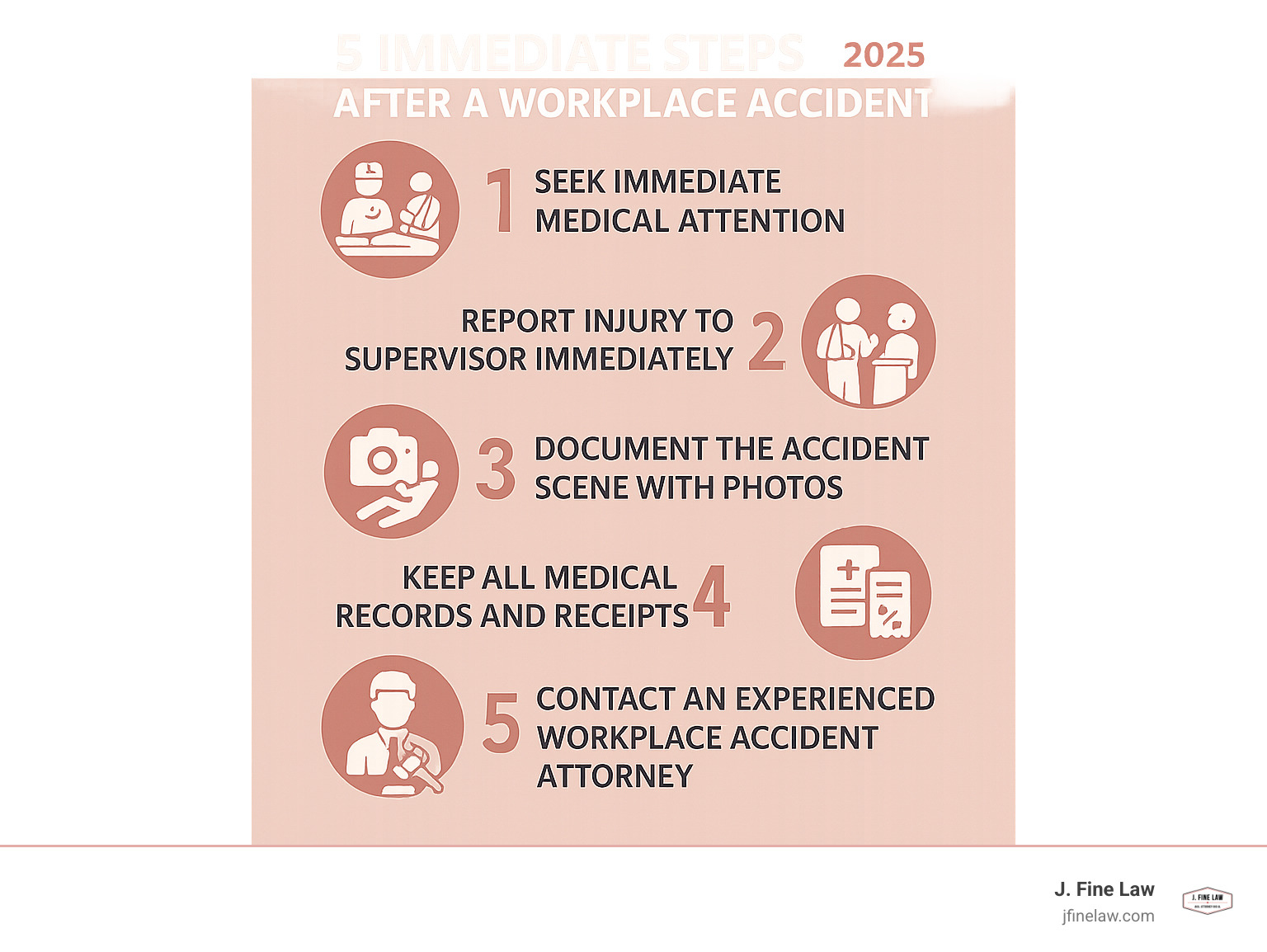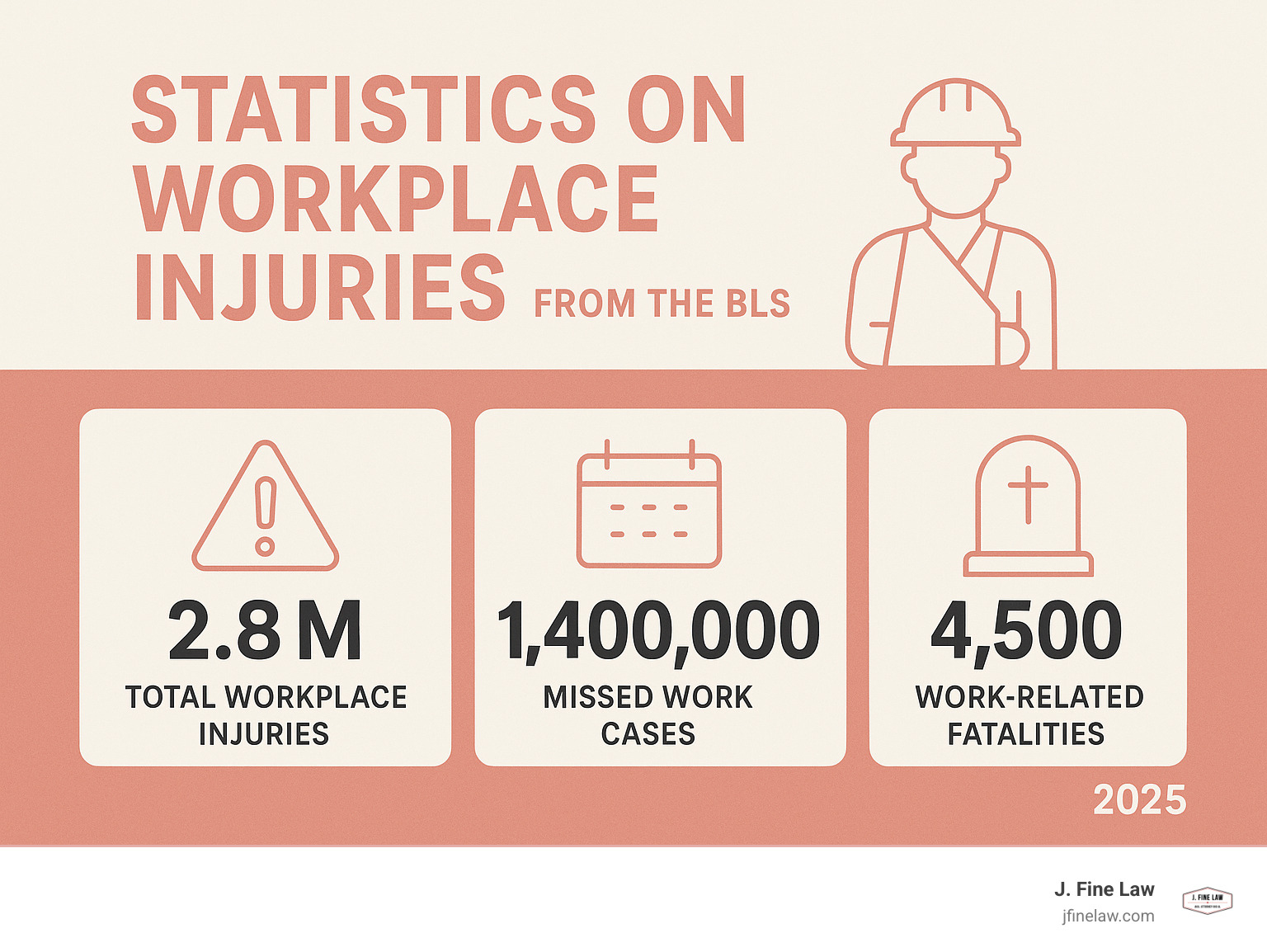Understanding Your Rights When Workplace Accidents Happen
Workplace accident law protects employees injured on the job and defines the legal responsibilities of both workers and employers. Here’s a brief overview:
Key Legal Protections for Employees:
- Right to workers’ compensation benefits (medical expenses and lost wages)
- Protection from employer retaliation for filing a claim
- Right to return to your job after recovery
- Right to refuse dangerous work without penalty
Key Legal Duties for Employers:
- Maintain a safe work environment
- Report serious injuries to government agencies
- Provide workers’ compensation insurance coverage
- Continue employee benefits during recovery
With over 4.9 million workplace accidents happening in the U.S. yearly, understanding these laws can mean the difference between struggling with medical bills and receiving the full compensation you deserve. The legal landscape involves multiple agencies—from OSHA setting safety standards to state workers’ compensation boards handling claims—making it complex to steer alone.
I’m Jason Fine, a Pennsylvania Super Lawyers nominee with over 25 years of experience representing victims of workplace accidents. My firm has secured some of the top workplace injury verdicts in Pennsylvania, ensuring injured workers receive the compensation they deserve.
Your Rights and Employer Duties After a Workplace Accident
Knowing what to do after a workplace accident is crucial for your health and any potential claim. Here are the essential steps and your legal protections.
Immediate Steps and Reporting Requirements
Your first priority is your health. The steps you take immediately can significantly impact your recovery and ability to pursue compensation.
1. Seek Immediate Medical Attention: This is paramount. Prompt medical care ensures you receive proper treatment and creates an official record of your injury. Your employer must provide first aid and arrange transportation to a healthcare professional if needed.
2. Notify Your Supervisor: Report the injury to your supervisor as soon as possible, both verbally and in writing. Delaying notification can jeopardize your right to benefits.
Once notified, your employer has several responsibilities under workplace accident law. They must provide first aid, secure the scene of a serious incident, and report the injury to the appropriate workers’ compensation board and government health and safety bodies (like OSHA). Timelines are strict, often requiring notification within 24-48 hours for critical injuries. Failure to report can lead to significant fines and penalties for the employer.
Understanding Your Protections Under Workplace Accident Law
As an employee, you have fundamental rights designed to protect you after an accident.
- Right to a Safe Workplace: Your employer has a legal obligation to take reasonable steps to prevent injuries, including providing necessary training and supervision.
- Right to Refuse Dangerous Work: You have the right to refuse work you believe poses an imminent danger to your health or safety without fear of disciplinary action.
- Anti-Retaliation Protections: You are legally protected from being fired or discriminated against for reporting an injury or filing a workers’ compensation claim.
- Job Reinstatement and Benefits: After recovering, many laws require employers to reinstate you to your previous job or a comparable one. They may also be obligated to continue contributions to your employment benefits, such as health insurance, for a period during your absence.
More info about Workplace Accidents in Pennsylvania.
The Role of OSHA in Workplace Safety
In the United States, the Occupational Safety and Health Administration (OSHA) is a key player in workplace accident law. Its mission is to ensure safe working conditions by setting and enforcing standards.
Employers are legally required to comply with OSHA standards and the “general duty clause,” which mandates a workplace free from recognized, serious hazards. This includes implementing safety programs, conducting regular inspections, and providing adequate training to employees on workplace hazards and safe work procedures.
OSHA conducts workplace inspections and investigates serious accidents to determine the cause and identify any safety violations. The findings from these investigations can lead to citations and penalties for the employer and may be relevant in future legal actions.
Navigating Workplace Accident Law and the Compensation Process
When a workplace accident occurs, understanding the compensation process is vital. This typically involves workers’ compensation, but there are circumstances where you might also be able to file a lawsuit.
Workers’ Compensation: The Standard Path
Workers’ compensation is a “no-fault” system, meaning you can receive benefits regardless of who caused the accident, as long as the injury occurred during your employment. In exchange, employees typically give up the right to sue their employer directly.
Covered Benefits: Benefits are intended to cover losses from your work injury. This typically includes all necessary medical treatment, replacement for a portion of your lost wages, and compensation for any permanent disability. Vocational rehabilitation may also be provided to help you return to work.
Claim Filing Process: The process involves reporting the injury to your employer, seeking medical care, and filing a formal claim with the state workers’ compensation board. It is crucial to keep meticulous records and be aware of strict filing deadlines in your state. If your claim is denied, you have the right to appeal the decision.
More info about a Workplace Accident Lawyer in New Jersey.
When Can You File a Lawsuit?
While workers’ compensation is generally the exclusive remedy, there are important exceptions where you might be able to file a personal injury lawsuit.
- Intentional Employer Conduct: If your employer intentionally caused your injury or acted with a “substantial certainty” that harm would occur, you might be able to sue them directly.
- Third-Party Liability: This is a common exception. If your injury was caused by someone other than your employer or a co-worker, you can sue that “third party.” Examples include manufacturers of defective equipment, negligent contractors on your job site, or at-fault drivers in a work-related car accident.
- Other Exceptions: You may also be able to sue if your employer illegally failed to carry workers’ compensation insurance or if your illness was caused by exposure to toxic substances from a third-party supplier.
A lawsuit allows you to seek damages not covered by workers’ comp, such as pain and suffering.
Maximizing Your Claim and Seeking Legal Help
Navigating the complexities of workplace accident law can be daunting, especially when dealing with insurance companies.
Claim Value and Settlements: The value of your claim depends on the severity of your injury, medical costs, and lost earning capacity. While average settlements can range from $2,000 to $40,000, serious injuries can result in much higher amounts. An attorney can help you weigh the pros and cons of a lump-sum settlement versus structured payments.
The Indispensable Role of Legal Counsel:
While you can file a claim alone, an experienced attorney is invaluable. A lawyer can ensure all documentation is filed correctly and on time, fight claim denials through the appeals process, and negotiate with insurers to secure full and fair compensation. Crucially, they can also determine if you have a valid third-party claim, potentially increasing your recovery significantly. Their goal is to protect your rights while you focus on healing.
At J. Fine Law, we specialize in helping individuals injured in workplace accidents in Pennsylvania and New Jersey. Our track record speaks for itself: a 98% success rate and over $50 million in settlements for our clients. We pride ourselves on rapid attorney response, ensuring you get the answers and support you need when you need them most. We’re here to fight for the compensation you deserve.
Contact us about your workplace accident case.





